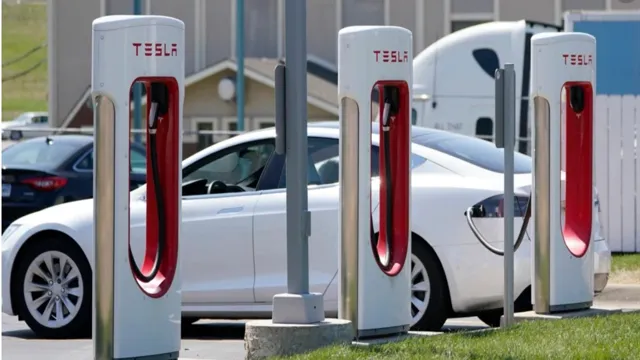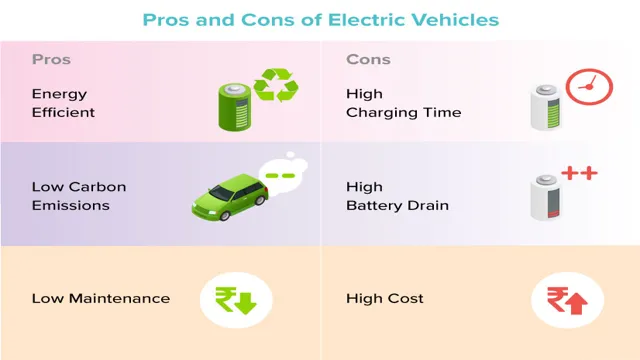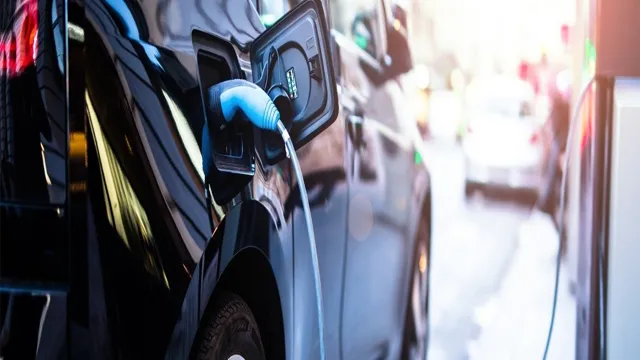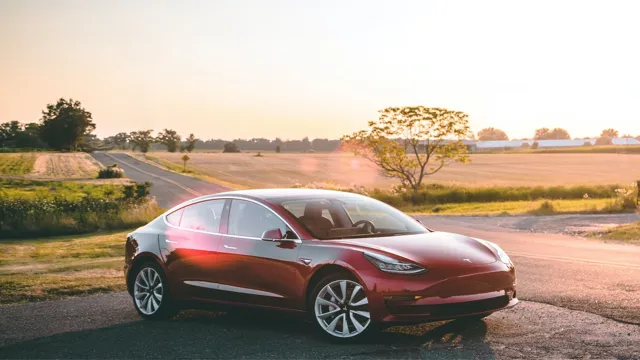Electric Cars: The Key to a Greener Future – Discover How They Benefit the Environment
Electric cars are rising in popularity due to their numerous benefits for the environment, as well as their impressive performance on the road. Gone are the days when electric vehicles were a niche choice, as today, they are a common sight on the streets of many major cities worldwide. In this blog post, we’ll dive into how electric cars benefit the environment, and why they’re a smart choice for anyone who cares about reducing their carbon footprint.
From zero emissions to improved air quality, there are a plethora of reasons why electric cars are a positive addition to the world of transportation. So, grab a cup of coffee and join us as we explore the ins and outs of how electric vehicles are making a difference in the world.
Reduced Emissions
Electric cars offer significant benefits to the environment by reducing emissions. These vehicles run on electricity and don’t emit harmful pollutants associated with combustion engines, such as carbon dioxide, nitrogen oxides, and particulate matter. As a result, electric cars help decrease the amount of air pollution and greenhouse gas emissions that contribute to climate change.
Additionally, they can help decrease our reliance on fossil fuels and reduce our carbon footprint. While the production of electric cars also has environmental impacts, their reduced emissions make them a more sustainable transportation option in the long run. Using electric cars can make a significant difference in the fight against climate change and air pollution, making it a smart and eco-friendly choice for environmentally conscious drivers.
Electric cars produce fewer emissions than gas-powered cars.
Electric cars are becoming increasingly popular due to their reduced emissions compared to gas-powered cars. These vehicles emit fewer pollutants that contribute to air pollution and global climate change. Gas-powered cars produce emissions from burning fossil fuels such as coal and oil, while electric cars generate energy from renewable sources such as wind and solar power.
In addition, electric cars do not produce as much noise or vibrations as traditional cars, which means less noise pollution in cities and neighborhoods. The shift towards electric cars not only benefits the environment but also reduces our dependence on non-renewable resources. As we continue to transition towards cleaner transportation options, electric cars are a crucial step towards a more sustainable future.

They don’t emit carbon dioxide or other harmful pollutants.
Electric cars are a great option for environmentally conscious individuals who want to reduce their carbon footprint. One of the biggest advantages of electric cars is that they produce zero emissions, unlike traditional gasoline-powered cars that emit harmful pollutants into the atmosphere. As a result, electric cars help to minimize air pollution and improve air quality, which is especially significant in densely populated urban areas where air pollution can be a major issue.
Additionally, electric cars don’t require oil changes, which means that they don’t consume as many natural resources as traditional vehicles. This not only reduces the environmental impact but also helps to reduce our dependence on foreign oil, which is a significant factor in international politics and economy. Furthermore, electric cars are often more efficient than traditional cars, making them a cost-effective and practical option for everyday transportation.
If you’re interested in reducing your environmental impact and saving money on gas, an electric car could be an excellent choice for you.
Less Dependence on Fossil Fuels
One of the primary benefits of electric cars for the environment is their lower dependence on fossil fuels. Unlike traditional gasoline-powered vehicles, electric cars run on electricity supplied by batteries. This shift away from fossil fuels significantly reduces greenhouse gas emissions, which are a leading cause of climate change.
Electric cars also help to decrease our reliance on foreign oil supplies, which can be unreliable and volatile. As we work to reduce our carbon footprint and mitigate the negative effects of global warming, electric cars represent a crucial step in the right direction. By embracing clean energy solutions like electric vehicles, we can ensure a cleaner, healthier future for ourselves and for generations to come.
Electric cars rely on electricity from renewable sources.
When it comes to sustainability, electric cars are a game-changer. They offer an eco-friendly and cost-effective alternative to traditional gas-powered vehicles, which rely on fossil fuels that have significant negative impacts on the environment. Electric cars run on electricity, and this electricity can come from renewable sources such as solar, wind, or hydroelectric power.
As technology has advanced, more and more countries are investing in renewable energy sources. This means that electric cars can help reduce our dependency on fossil fuels while helping cut down the carbon footprint of the transportation sector. By switching to an electric vehicle, you are helping to reduce greenhouse gas emissions while also saving on fuel costs.
So, not only is it good for the environment, it’s good for your wallet too. It’s a win-win situation for everyone involved!
This means we’re less dependent on oil and gas.
As we continue to invest in renewable energy sources such as wind and solar power, we are gradually becoming less reliant on fossil fuels like oil and gas. This shift is important because it means we’re reducing our carbon footprint and contributing to a more sustainable future. Imagine relying less on your car and more on public transportation or biking – it’s similar to what we’re doing on a larger scale.
By investing in these cleaner energy options, we’re reducing the amount of pollution in our environment and decreasing our dependence on finite resources. This will help us become more self-sufficient and less vulnerable to supply shortages or price fluctuations in the oil and gas markets. While there is still much work to be done, this shift towards renewable energy is a promising start towards a greener, healthier planet.
It also reduces greenhouse gases emissions.
Less dependence on fossil fuels is a major advantage of using renewable energy sources. This is because renewable energy sources such as solar, wind, and hydro power do not rely on finite resources, unlike fossil fuels such as coal, oil, and natural gas. To extract and burn fossil fuels, extensive drilling, mining, and transportation infrastructure is required, which results in greenhouse gas emissions and air pollution.
However, with renewable energy sources, electricity is generated without any harmful side effects and it is free from the risks associated with fossil fuel spills and accidents. It is like switching from a gas-guzzling car to an eco-friendly electric vehicle; it decreases the dependence on oil and gas, and at the same time cuts down on pollution and greenhouse gas emissions that contribute to global warming. By transitioning to renewable energy, we can reduce our reliance on finite resources and save the planet at the same time.
Reduced Noise Pollution
When it comes to the environment, reducing noise pollution might not be the first thing that comes to mind. However, electric cars have the potential to make a significant impact in this area. With traditional gas-fueled vehicles, the sound of their engines can be deafening, especially in areas with high traffic volume.
This constant noise can have detrimental effects on our physical and mental health, including hearing loss, anxiety, and sleep disturbances. By contrast, electric vehicles run almost silently, and even when they do emit sound, it is at much lower decibel levels than their combustion engine counterparts. This means that, as more people make the switch to electric cars, we can look forward to a much quieter, less stressful environment around our roads and highways.
So, along with the many other environmental benefits of electric cars, this reduction in noise pollution is just one more reason to switch to cleaner, greener transportation.
Electric cars produce less noise than traditional cars.
Electric cars are becoming increasingly popular, and one of the main reasons is their lower noise levels compared to traditional cars. While the sound of a car engine might be music to some ears, it can be a nuisance to many others. Electric cars rely on electric motors to power their wheels, which produce very little noise compared to combustion engines.
This means that electric cars are generally much quieter, making them an excellent choice for areas where noise pollution is a concern. In addition to being less disruptive to people’s day-to-day lives, less noise can also have positive effects on the environment by reducing noise pollution levels in urban areas. So if you’re looking for a car that’s kinder on your ears and the environment, an electric car might be just what you need.
They’re almost silent, reducing noise pollution in urban areas.
One of the most significant advantages of electric scooters is that they’re almost completely silent, which significantly reduces noise pollution in urban areas. Unlike traditional gas-powered vehicles that produce loud and disruptive engine noises, the only sounds electric scooters make are the faint hum of the electric motor and the gentle whir of the wheels on the pavement. This feature makes these scooters an excellent option for those who want to get around quietly without disturbing others.
Moreover, electric scooters are also environmentally friendly, producing zero emissions that could harm the air quality in cities. So, if you’re looking for a great way to reduce your carbon footprint and help combat noise pollution, electric scooters might be the perfect solution for you!
Conclusion
In a world where our every move is calculated for its environmental impact, electric cars have emerged as a shining beacon of hope. With their zero emissions and renewable energy sources, they are the superheroes of the automotive world, saving the planet while also providing us with smooth and energy-efficient driving experiences. So, let’s all unite in adopting this cleaner and greener mode of transportation and pave the way for a brighter, healthier future for all.
“
FAQs
What is the environmental impact of traditional gasoline cars?
Traditional gasoline cars contribute to air pollution and emit harmful greenhouse gases, leading to negative impacts on the environment.
How do electric cars reduce greenhouse gas emissions?
Electric cars run on batteries, which means they do not produce emissions during driving. This leads to a significant reduction in greenhouse gas emissions.
Can electric cars be powered by renewable energy sources?
Yes, electric cars can be powered by renewable energy sources like solar or wind power. This makes them even more environmentally friendly.
Do electric cars help reduce dependence on fossil fuels?
Yes, electric cars reduce our dependence on fossil fuels because they do not require gasoline or diesel to operate. This helps reduce our carbon footprint and the harmful impacts of fossil fuels on the environment.




